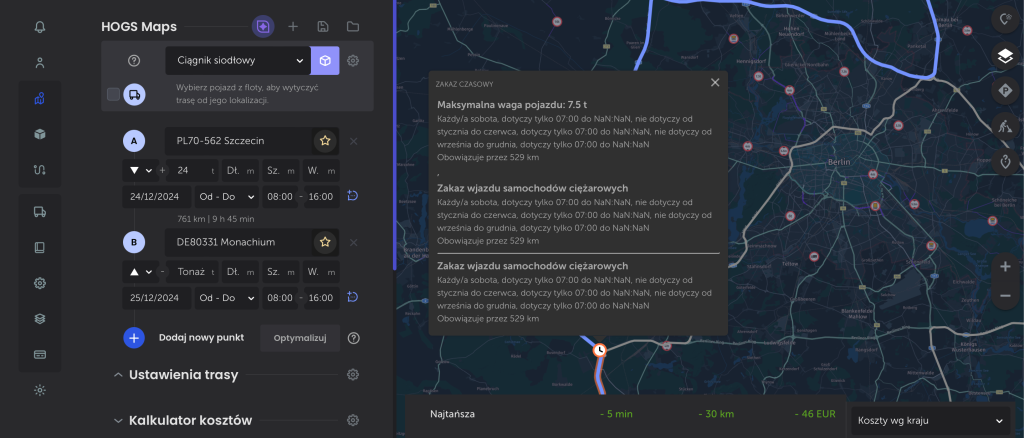Truck driving ban - Germany 2025
20 March '25
Reading time 4 minutes
Germany has detailed regulations regarding the truck driving ban, aimed at improving road safety and reducing traffic congestion during designated periods.
These restrictions primarily apply to vehicles with a gross vehicle weight (GVW) exceeding 7.5 tons and all trucks with trailers and semi-trailers, regardless of their weight.
Truck traffic bans on Sundays and public holidays
A nationwide truck driving ban is in effect across Germany every Sunday and on public holidays from 00:00 to 22:00.
Frequently asked: When is the truck driving ban in Germany 2025?

In 2025, the truck driving ban regulations in Germany will remain similar to previous years.
Here is the complete list of truck traffic bans on public holidays:
| Date | Holiday | Federal States Affected |
|---|---|---|
| January 1, 2025 | New Year’s Day | All states |
| April 18, 2025 | Good Friday | All states |
| April 21, 2025 | Easter Monday | All states |
| May 1, 2025 | Labour Day | All states |
| May 29, 2025 | Ascension Day | All states |
| June 9, 2025 | Pentecost Monday | All states |
| June 19, 2025 | Corpus Christi | Baden-Württemberg, Bavaria, Hesse, North Rhine-Westphalia, Rhineland-Palatinate, Saarland |
| October 3, 2025 | German Unity Day | All states |
| October 31, 2025 | Reformation Day | Brandenburg, Bremen, Hamburg, Mecklenburg-Western Pomerania, Lower Saxony, Saxony, Saxony-Anhalt, Schleswig-Holstein, Thuringia |
| November 1, 2025 | All Saints’ Day | Baden-Württemberg, Bavaria, North Rhine-Westphalia, Rhineland-Palatinate, Saarland |
| December 25, 2025 | Christmas Day | All states |
| December 26, 2025 | Boxing Day | All states |
Truck driving ban in Germany during the summer

In the summer season, an additional truck driving ban applies from July 1 to August 31, restricting movement on Saturdays from 7:00 AM to 8:00 PM. However, this ban does not cover the entire road network—it applies only to selected highway (Autobahn) and federal road sections.
The main goal of these restrictions is to facilitate tourist traffic and reduce congestion during peak vacation travel periods.
Truck driving ban in Germany – exemptions

There are specific exemptions to the truck driving ban, particularly for essential goods transport and emergency situations. Exempted vehicles include those transporting:
- Fresh food products such as milk, meat, fish and fruit
- Postal shipments and other public service deliveries
- Dangerous goods transport
Additionally, vehicles providing emergency assistance or involved in road maintenance are exempt from these restrictions.
To apply for an exemption, a written request must be submitted to the local road traffic authority in the district where the loading takes place or where the transport company is based.
The request must include: a copy of the vehicle registration certificate and transport documentation proving the necessity of the exemption.
Route planning
Before traveling through Germany, especially during restricted periods, it is advisable to plan the journey carefullywhile considering all driving bans to avoid unexpected delays and penalties.
Using advanced logistics tools such as HOGS Maps can significantly enhance transport efficiency.

This tool not only provides real-time updates on truck driving restrictions but also helps with:
- Selecting the best route
- Calculating precise transport costs
- Analyzing historical freight rates
- Estimating the total cost of transport
Proper planning ensures smooth operations and prevents unnecessary disruptions.
Penalties for violating truck driving bans

Failing to comply with truck driving restrictions can result in significant financial penalties for both drivers and transport company owners.
- Truck drivers violating the ban face a fine of €120
- Transport company owners or freight forwarders who allow a truck to operate despite restrictions may be fined €570
Additionally, during road inspections, violating trucks may be ordered to stop immediately until the restriction period ends, leading to extra costs such as parking fees.
Try HOGS Maps for 14 days – totally free!
Increased inspections on holidays and weekends
During high-restriction periods (Sundays, public holidays and summer Saturdays), German police and regulatory authorities conduct frequent roadside inspections on highways, federal roads and near borders.
These thorough inspections often lead to on-the-spot fines for any detected violations.
Summary
Understanding and complying with truck driving bans in Germany is essential for safe and efficient transport operations.
Regularly monitoring regulatory updates and planning routes according to restrictions will help avoid complications and ensure smooth freight movement throughout Germany.
Frequently asked questions (FAQ)
Who is exempt from the truck driving ban in Germany?

The truck driving ban in Germany does not apply to vehicles transporting dangerous goods, fresh food products, or postal shipments. Additionally, trucks providing emergency assistance are exempt from these restrictions.
The ban also does not apply to passenger cars or trucks with a GVW below 7.5 tons, unless they are towing a trailer or semi-trailer.
Is there a truck driving ban on November 1 in Germany?
Yes, November 1 (All Saints’ Day) is a restricted driving day for trucks in certain German federal states. The driving ban applies in the following states:
- Saarland
- Rhineland-Palatinate
- North Rhine-Westphalia
- Baden-Württemberg
- Bavaria
The restriction applies to trucks over 7.5 tons GVW as well as all trucks with trailers or semi-trailers and is in effect from 00:00 to 22:00.
On which days is truck driving banned in Germany?
The truck driving ban in Germany applies:
- Every Sunday and public holiday from 00:00 to 22:00
- During the summer period (July 1 – August 31) on Saturdays from 7:00 AM to 8:00 PM on selected road sections
For a detailed list of truck driving bans in Germany in 2025, click HERE.

